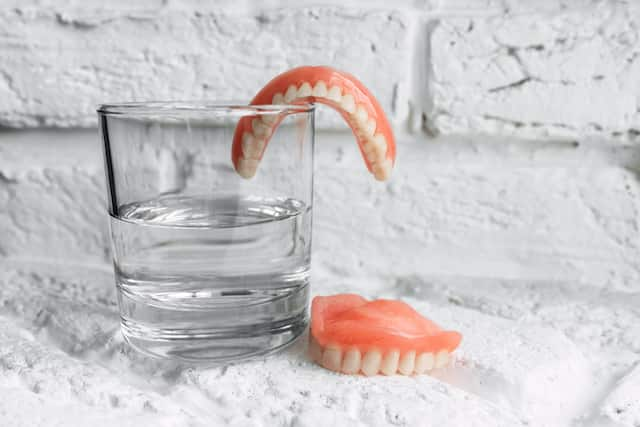The purpose of wearing dentures is to enable patients who have lost some or all of their teeth to speak, smile and eat naturally. These things are only possible, however, if their dentures are comfortable and well-maintained. Learning how to clean dentures is important to maintaining good daily hygiene, but occasionally you may find it necessary to take additional steps to eliminate the tougher-to-remove bacteria.

How To Clean Dentures To Avoid Bacteria Build-up
How Food Accumulates in Dentures
Food particles collect on your dentures every time you eat, for several reasons:
- The food that drifts to the floor of your mouth can land and become trapped under a lower denture.
- Debris that gets pushed backward and upward as you chew and swallow may wind up in between your palate and the upper denture.
- Food sticks to rough plastic surface of dentures far more easily than it does to oral tissues, which allows it to build up over time.
Dentures take up a fair amount of space in the mouth, though, which means you are much more likely to feel food remnants collecting underneath them than someone with natural teeth.
How Problems Arise from This Build-up
Food particles stick to certain areas of the denture more than others, and if they aren't removed frequently, they can lead to a variety of oral problems. A research study published in the Journal of Pharmaceutical Sciences and Research notes that around 18% of denture wearers also complained of halitosis due to denture wearing. And when food accumulating in the mouth, it can turn rancid in a matter of hours. To determine whether your dentures are affecting your breath, consider placing your dentures in a sealed, plastic sandwich bag for five minutes. When you unseal the bag, you'll get an idea of whether your halitosis is caused by your dentures.
Inflammation of oral tissue is another legitimate complication. When tough-to-remove particles collect and build up on a section of the dentures that is in contact with your mouth, the bacteria that feed on this leftover food can transfer to the gums and tissues – causing infection. The National Health Portal of India explains that mouth ulcers are called stomatitis in the medical terminology. Mouth ulcers are usually pale or yellow painful sores with a red outer ring. These appear inside mouth, on the cheeks, lips and sometimes can also appear on the tongue. Usually a single ulcer inside mouth may be due to cheek or tongue biting, or damage caused by sharp teeth, aggressive brushing or poorly fitting dentures.
The International Journal of Periodontology and Implantology explains that the mouth is a significant potential source of infection and inflammation that contributes to the total burden of disease, and to overall health. Research suggests that there is an interrelationship between oral infection, inflammation and systemic health. It includes a connection between periodontal disease and low birth weight or early delivery births, periodontal disease and diabetes mellitus, periodontal disease and respiratory disorders, periodontal disease and rheumatoid arthritis, periodontal disease and osteoporosis, periodontal disease and Alzheimer’s disease. This makes it essential that you know how to clean dentures effectively, regardless of the type of denture for which you're fitted.
How to Clean Off Dentures
In addition to your regular daily brushing, it's necessary to use a deep-cleaning solution periodically to soak off food deposits from the denture. These solutions typically come in the form of effervescent tablets, which are specifically formulated to clean dentures.
In order to maintain your dentures, IGNOU, School of Health Sciences suggests to avoid stiff-bristled brushes, strong cleansers and harsh toothpaste, whitening toothpastes and bleach-containing. IGNOU, School of Health Sciences further suggests to avoid hot or boiling water that could warp your dentures.
After soaking, check the inside of the denture for any remaining food particles, and brush or scrub using a soft-bristled toothbrush whose shape is conducive to denture care.
Ultimately, ensure that you rinse the dentures exceptionally well afterward; even the gentlest cleansing solution can contain chemicals that are harmful to your mouth's natural tissues.
Just because you wear dentures doesn't mean you can't enjoy the pleasure of freshly-brushed teeth. Complete your denture-cleaning procedure with a thorough brushing of your gums using a soft-bristled toothbrush and everyday, fluoridated toothpaste. If you notice any mouth sores, rinsing with a mouth sore rinse will help to heal them and protect against bacteria in the long term.
This article is intended to promote understanding of and knowledge about general oral health topics. It is not intended to be a substitute for professional advice, diagnosis or treatment. Always seek the advice of your dentist or other qualified healthcare provider with any questions you may have regarding a medical condition or treatment.





